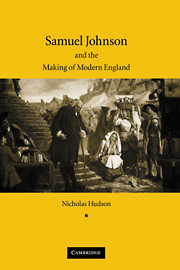Book contents
- Frontmatter
- Contents
- Acknowledgments
- Introduction
- 1 From “rank” to “class”: the changing structures of social hierarchy
- 2 Constructing the middle-class woman
- 3 From “Broad-bottom” to “party”: the rise of modern English politics
- 4 “The voice of the nation”: the evolution of the “public”
- 5 The construction of English nationhood
- 6 The material and ideological development of the British Empire
- Conclusion
- Notes
- Bibliography
- Index
6 - The material and ideological development of the British Empire
Published online by Cambridge University Press: 31 August 2009
- Frontmatter
- Contents
- Acknowledgments
- Introduction
- 1 From “rank” to “class”: the changing structures of social hierarchy
- 2 Constructing the middle-class woman
- 3 From “Broad-bottom” to “party”: the rise of modern English politics
- 4 “The voice of the nation”: the evolution of the “public”
- 5 The construction of English nationhood
- 6 The material and ideological development of the British Empire
- Conclusion
- Notes
- Bibliography
- Index
Summary
“UNIVERSAL MONARCHY” VERSUS THE “EMPIRE OF GOODS”: DEBATES ABOUT EMPIRE 1690–1760
Johnson may have been born into a nation that considered itself a medium power, a factionalized outpost on the watery margins of imperial grandeur on the Continent, but he died in a nation that wielded a sceptre over large swaths of the world. It was his age that gave the world the British Empire – a process that was gradual and closely interconnected with the other social, political, and economic developments that we have examined in previous chapters. Particularly in more fashionable branches of literary and post-colonial studies, however, it often seems that “imperialism” sprang, like Milton's Sin, from a contriving brain instilled with the fully formed “project” to appropriate the globe. It is merely “curious,” writes Edward W. Said, that the Victorian defender of British imperialism J. R. Seeley should have thought that “some of Europe's overseas empires were originally acquired absentmindedly.” The British Empire, from the beginning, must have been intended: “the enterprise of empire depends upon the idea of having an empire.” “We must not forget that there was very little domestic resistance to these empires,” Said tells us, for “imperium” implies “a protracted, almost metaphysical obligation to subordinate inferior, or less advanced people.” The thesis that British imperialism, from the outset, represented a conscious, aim-driven, and nationally sanctioned drive to absorb the world and its lesser peoples has remained the virtually unchallenged premise of post-colonial scholarship.
- Type
- Chapter
- Information
- Samuel Johnson and the Making of Modern England , pp. 170 - 220Publisher: Cambridge University PressPrint publication year: 2003

